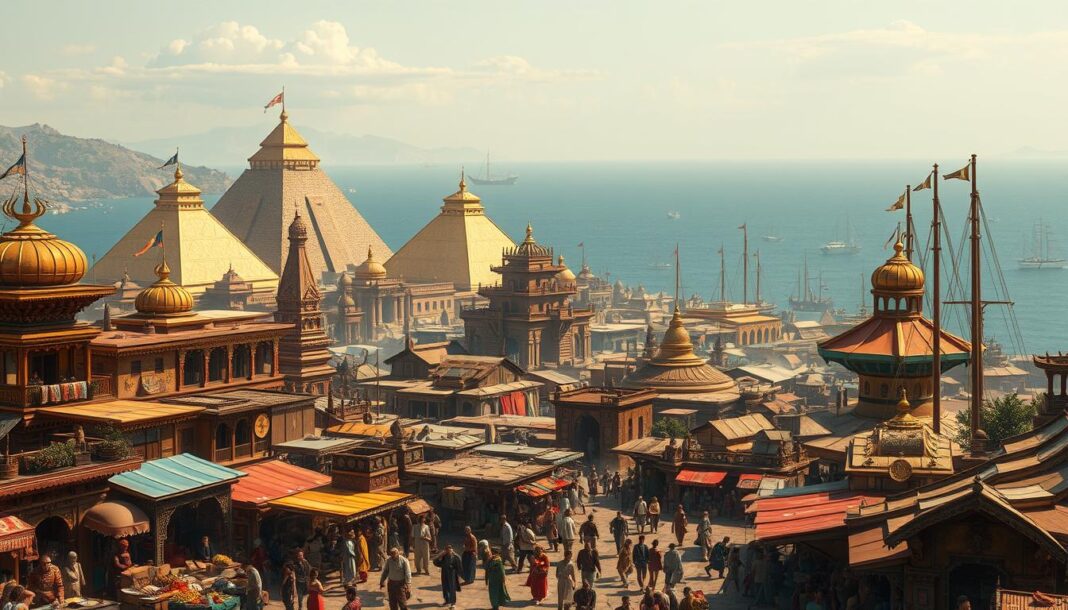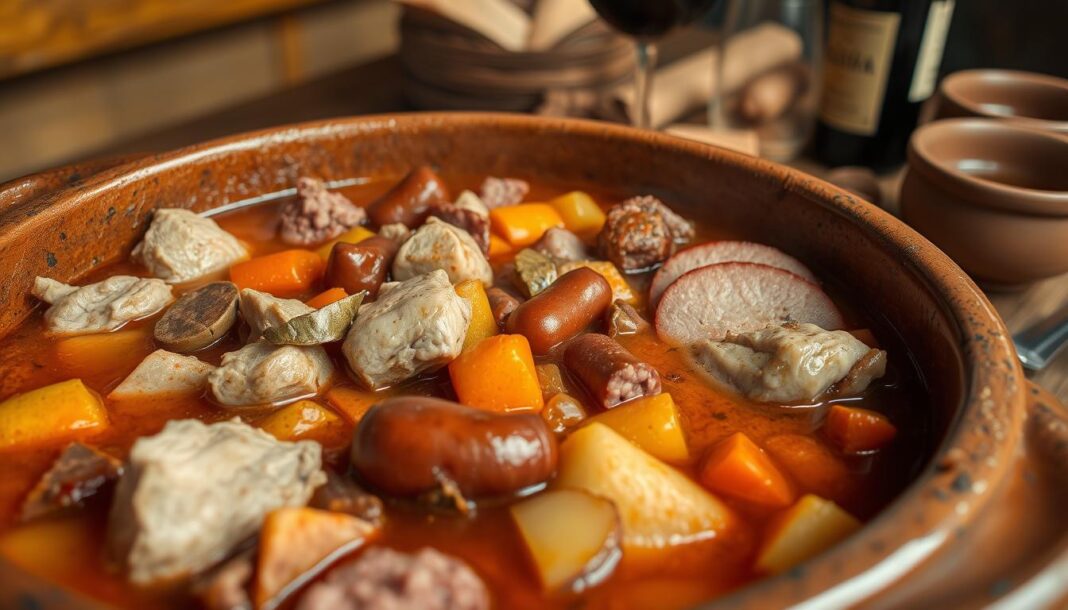We explore the fascinating world of Tyrosh, a distinctive Free City in George R.R. Martin’s Game of Thrones universe. Located on an island in the Narrow Sea, Tyrosh is known for its vibrant culture and strategic position.
The city’s unique characteristics, such as its Bleeding Tower and governance by the Archon of Tyrosh and the High Council, have played significant roles in shaping the history of Westeros and Essos. The Temple of Trios is another landmark that contributes to Tyrosh’s rich cultural tapestry.
We will uncover how Tyrosh’s culture, politics, and historical significance have enriched the Game of Thrones narrative, examining its evolution from a Valyrian military outpost to its contemporary role in the series.
Key Takeaways
- Tyrosh is a significant cultural and strategic location in the Game of Thrones universe.
- The city’s governance structure, led by the Archon and High Council, influences major events.
- Landmarks like the Bleeding Tower and Temple of Trios are crucial to Tyrosh’s identity.
- Tyrosh’s history and culture have contributed substantially to the Game of Thrones narrative.
- The city’s position in the Narrow Sea makes it a pivotal location for trade and conflict.
The Foundation of Tyrosh in the World of Ice and Fire
Tyrosh, one of the Free Cities, has a rich history that began with humble beginnings as a Valyrian military outpost. Established on a bleak stony isle, its initial purpose was to control shipping through the Stepstones. This strategic location soon proved to be a catalyst for growth, as the discovery of a unique variety of sea snail in the nearby waters revolutionized the city’s destiny.

The secretions from these sea snails were used to create a highly prized dye among Valyrian nobles. This discovery transformed Tyrosh from a mere military outpost to a thriving commercial center. Thousands of merchants flocked to Tyrosh, developing it into a major city within a generation. The ingenuity of Tyroshi dyers, who learned to produce different colors by varying the diet of the snails, further established the city’s reputation for vibrant dyes.
From Outpost to Thriving City
The aftermath of the Doom of Valyria had significant implications for Tyrosh. Some Dragonlords survived the catastrophe by being in Tyrosh, but they were eventually killed by the citizens who seized the opportunity to assert their independence. Tyrosh then claimed portions of the Stepstones, establishing itself as a maritime power in the region.
| Event | Description | Impact on Tyrosh |
|---|---|---|
| Establishment as Valyrian Outpost | Control shipping through Stepstones | Strategic Military Presence |
| Discovery of Sea Snail | Creation of prized dye | Transformation into commercial center |
| Doom of Valyria | Surviving Dragonlords killed | Independence from Valyria |
Tyrosh’s connection to Westerosi politics began early, with rumors that Dowager Queen Alyssa Velaryon and her children sought refuge in Tyrosh after fleeing Dragonstone in 44 AC. This represents one of the earliest documented connections between Tyrosh and the politics of the Seven Kingdoms.
Tyroshi Culture and Distinctive Appearance
The Tyroshi people are known for their vibrant cultural identity, which is deeply rooted in their flamboyant appearance and distinctive customs. They are often described as boisterous, flamboyant, and excessively greedy, with booming voices that command attention. Their love for bright colors is evident in their fashion choices, particularly in their practice of dyeing hair, beards, and whiskers in bright, unnatural colors derived from secretions of a local sea snail.
The Tyroshi speak a corrupted dialect of High Valyrian, which contributes to their cultural identity. Characters like Tyrion Lannister have noted the distinctive qualities of the Tyroshi dialect, sometimes describing it as “ludicrous” or “wet and girly.” This unique linguistic flavor adds to the richness of their cultural heritage.
The Flamboyant Fashion and Colorful Hair Dyes
The Tyroshi are particularly famous for their bold fashion choices. They commonly dye their hair and beards in bright, odd colors, making them stand out in any crowd. This practice is not just a matter of personal preference but also a cultural statement, reflecting their love for extravagance and celebration.
One of the most recognizable landmarks in Tyrosh is the Fountain of the Drunken God, though its religious significance remains ambiguous. The imagery associated with the drunken god reflects the Tyroshi’s reputation for excess and celebration, characteristics that define their cultural approach to life.
Tyrosh’s strategic location makes it an important port of call for ships traveling between Braavos and Oldtown. This position has turned Tyrosh into a cultural crossroads where diverse traditions intermingle, further enriching the Tyroshi cultural identity.
The Political Structure and Economy of Tyrosh
In the world of Game of Thrones, Tyrosh stands out for its oligarchic political system, where the Archon is selected from among the Conclave of Magisters. This unique governance structure differs significantly from the monarchical systems prevalent in Westeros. The Archon of Tyrosh is chosen to serve for a term by and from the city’s Conclave of Magisters, whose members are selected from among the wealthy and noble men of Tyrosh.
The Role of the Archon and the Conclave
The Archon of Tyrosh plays a pivotal role in the governance of the city, making crucial decisions that impact not only Tyrosh but also the broader geopolitical landscape of Essos and sometimes even Westeros. The Conclave of Magisters, essentially acting as a High Council, supports the Archon in these decisions. Tyrosh regularly finds itself at odds with its neighbors, Lys and Myr, over control of the Disputed Lands, a region between the three cities.
Tyrosh boasts a large and powerful fleet, which plays a crucial role in its economy and defense. At the mouth of its harbor lies the Bleeding Tower, a defensive structure that symbolizes the city’s maritime power and commercial importance. The economic foundations of Tyrosh rely heavily on trade, particularly in their famous dyes derived from a special sea snail species found only in their waters.
The diplomatic relations of Tyrosh with other regions, including Westeros, are also noteworthy. For instance, the Archon of Tyrosh traveled to the Seven Kingdoms in 49 AC for the Golden Wedding of Rogar Baratheon and Alyssa Velaryon, accompanied by his Archon’s daughter, highlighting the city’s engagement in significant political events beyond its borders.
Tyroshi in Game of Thrones: Book vs. Show Depictions
As we delve into the realm of Tyrosh within the Game of Thrones universe, we notice a divergence in how this city is represented in the literary and televised versions. The books, penned by George R.R. Martin, offer a rich, detailed portrayal of Tyroshi culture and its people, while the show adaptation makes certain creative choices that alter this representation.
One of the most striking differences lies in the depiction of Tyroshi characters’ appearance. In the books, Tyroshi are described as being flamboyantly dressed with brightly colored hair and beards, a trait that is less pronounced in the show. For instance, Daario Naharis, a Tyroshi character, is known for his blue beard in the books, a detail not fully captured in the show’s portrayal.
Vivid Descriptions by George R.R. Martin
George R.R. Martin’s vivid descriptions of Tyrosh bring the city to life through sensory details. For example, when Daenerys smells garlic and roast pepper in the Western Market of Vaes Dothrak, it reminds her of the alleys of Tyrosh, evoking a fond memory. This use of sensory elements creates a rich, immersive world that extends beyond visual descriptions.
The presence of Tyroshi characters and ships in King’s Landing, such as the Storm Dancer galley, highlights the close commercial and cultural ties between the Free Cities and Westeros. Tyrion Lannister’s observation of a purple-bearded Tyroshi at Chataya’s brothel further illustrates the cosmopolitan nature of King’s Landing.
| Aspect | Book Depiction | Show Depiction |
|---|---|---|
| Tyroshi Appearance | Flamboyant, brightly colored hair and beards | More subdued, less emphasis on bright colors |
| Cultural Influence | Strong presence in King’s Landing, cultural exchange | Less emphasized, fewer Tyroshi characters |
| Notable Landmarks | Fountain of the Drunken God mentioned | Omitted from the show |
The execution of Brandon Stark by King Aerys Targaryen using a Tyroshi strangulation device is another example of how Tyroshi inventions were known and used throughout the Seven Kingdoms, a detail that adds depth to the world-building.
The Triarchy and the Daughters’ War
In the aftermath of Volantis’s defeat at the Battle of the Borderland, Tyrosh forged an alliance with Lys and Myr, creating the Triarchy in 96 AC. This coalition, also known as the Kingdom of the Three Daughters, was a significant development in the history of the Free Cities.
Formation of the Kingdom of the Three Daughters
The Kingdom of the Three Daughters was formed as a response to the shifting balance of power in the region. The High Council of the Triarchy was established, comprising thirty-three Magisters, with eleven representatives from each of the three cities. This complex political structure attempted to balance the interests of Tyrosh, Lys, and Myr, but it was inherently challenging due to the competing agendas of its member cities.
The Triarchy’s formation was a strategic move, aimed at consolidating power and influence in the region. However, the alliance was fraught with tension, particularly over disputed lands and economic interests. The Council Triarchy functioned as a governing body, but its effectiveness was often hampered by the self-interest of its members, leading to frequent deadlocks and inefficiencies.
The Triarchy’s military engagements, particularly its conflict with Prince Daemon Targaryen over the Stepstones in 106 AC, highlighted its role as a significant military power. Racallio Ryndoon of Tyrosh played a crucial role in this conflict, leading an invasion fleet against Daemon’s forces and later claiming the title “King of the Narrow Sea.” The Triarchy’s interactions with other major powers, such as the Targaryen dynasty, demonstrate its importance in the geopolitical landscape of the time.
The alliance ultimately collapsed due to internal tensions, culminating in the Daughters’ War following the assassination of Admiral Sharako. The war marked the end of the Triarchy, as Tyrosh, Lys, and Myr returned to their individual pursuits, with Tyrosh claiming the Stepstones. The legacy of the Triarchy and its conflicts continues to be felt, with figures like Elissa Farman visiting Tyrosh during her voyages, underscoring the city’s significance as a maritime hub.
Tyrosh and the Targaryen Dynasty
As we explore the complex relationship between Tyrosh and the Targaryen dynasty, we uncover a rich tapestry of diplomatic interactions and power struggles that significantly influenced the history of Westeros and the Narrow Sea.
The Targaryen dynasty’s interactions with Tyrosh were multifaceted, involving both cooperation and conflict. One of the earliest significant interactions was during the reign of King Jaehaerys I Targaryen, who was requested to mediate a conflict between Tyrosh and Pentos in 58 AC.
Early Interactions with Jaehaerys I Targaryen
In 58 AC, both Tyrosh and Pentos requested that King Jaehaerys I Targaryen act as a mediator in their dispute, showcasing the respect and influence the Targaryen rulers had beyond Westeros. Jaehaerys successfully brokered “A Treaty of Eternal Peace,” demonstrating his diplomatic prowess and enhancing his reputation as a peacemaker.
The suggestion that King Jaehaerys Targaryen should marry the Archon’s daughter represented an early attempt at a political alliance between Westeros and Tyrosh. However, this proposal was ultimately rejected due to concerns about the Westerosi acceptance of a foreign queen.
During the Dance of Dragons civil war, Tyrosh played a crucial role when the High Council of the Triarchy decided to support the Greens, significantly altering the balance of power in the Narrow Sea. A Tyroshi captain captured Prince Viserys Targaryen before the Battle of the Gullet, an event with lasting implications for Targaryen-Tyroshi relations.
The interactions between the Targaryen dynasty and Tyrosh continued through the generations, with King Aerys II Targaryen supporting Volantis in its trade war against Tyrosh and Myr, marking a departure from traditional Westerosi neutrality in Free City conflicts.
The strategic importance of Tyrosh in the Narrow Sea made it a crucial point of consideration for Targaryen rulers, forcing them to develop diplomatic strategies for dealing with this powerful Free City.
The Blackfyre Rebellions and Tyroshi Connections
The history of Westeros is marked by the Blackfyre Rebellions, with the city of Tyrosh serving as a key ally and refuge for the Blackfyre pretenders. The Blackfyre Rebellions were a series of conflicts that stemmed from the legitimacy and succession disputes following the reign of King Aegon IV Targaryen.
One of the pivotal moments in the Blackfyre saga was the marriage alliance between Daemon Blackfyre, Aegon IV’s legitimized bastard son, and Rohanne of Tyrosh. This alliance was arranged by King Aegon IV himself before his death. After Aegon’s passing, his successor, King Daeron II Targaryen, ensured the marriage took place by paying the dowry to the Archon of Tyrosh.
Daemon Blackfyre’s Marriage to Rohanne of Tyrosh
The marriage between Daemon Blackfyre and Rohanne of Tyrosh provided the Blackfyre line with significant political connections and a safe haven. After the First Blackfyre Rebellion resulted in the defeat and death of Daemon and his eldest sons, Aegor Rivers (also known as Bittersteel) gathered Daemon’s surviving family and fled to Tyrosh. The city became a base for future Blackfyre pretenders, shaping the legacy of the Dance of Dragons and creating an enduring threat to Targaryen rule.
The alliance between Tyrosh and Lys during certain periods further bolstered Blackfyre ambitions by providing additional resources and support. The culmination of Tyroshi involvement in Westerosi politics was seen in the formation of the Band of Nine, which included the Tyroshi merchant Alequo Adarys and the Blackfyre pretender Maelys I Blackfyre.
- The Band of Nine successfully sacked Tyrosh, deposed the Archon, and installed Alequo Adarys as its head of state, demonstrating the city’s vulnerability to external forces.
- From Tyrosh, the Band of Nine conquered the Stepstones and eventually invaded Westeros, leading to the Fifth Blackfyre Rebellion, also known as the War of the Ninepenny Kings.
- This conflict represents the final chapter in the long-running Blackfyre saga, with Tyroshi connections playing a central role throughout the rebellions.
The Blackfyre Rebellions and Tyroshi connections highlight the complex interplay between the politics of Westeros and the Free Cities. The legacy of these conflicts continues to shape the narrative of the Game of Thrones universe.
Notable Tyroshi Characters in the Game of Thrones Universe
Tyrosh, a city known for its flamboyance, has produced some of the most memorable characters in the Game of Thrones universe. The city’s unique cultural traits are reflected in its people, who often embody the extravagance and boldness associated with Tyrosh.
One of the most prominent Tyroshi characters is Daario Naharis, known for his striking appearance and martial prowess. We’ll delve deeper into his character in the following section.
Daario Naharis: The Blue-Bearded Sellsword
Daario Naharis, Captain of the Stormcrows, is perhaps the most iconic Tyroshi character in the Game of Thrones series. His blue beard, a symbol of Tyroshi flamboyance, is a visual representation of the city’s cultural influence. In the books, Daario’s appearance is a testament to the Tyroshi love for vibrant colors and bold fashion statements. Although the show adaptation toned down this aspect, Daario’s character remains a fascinating representation of Tyroshi culture.
Other notable Tyroshi characters include Kiera of Tyrosh, who married into the Targaryen dynasty, creating significant diplomatic ties between Tyrosh and Westeros. Her marriages to Prince Valarr and later Prince Daeron Targaryen highlight the complex web of alliances between the Free Cities and the Seven Kingdoms.
The Temple of Trios in Tyrosh serves as a backdrop for darker events, such as the gruesome discovery of a murdered dwarf juggler. This highlights the city’s more sinister aspects. Lord Alyn Velaryon‘s interactions with Tyroshi prisoners at Bloodstone demonstrate the complex and often violent relationships between Westerosi nobles and Tyroshi citizens.
Tyrion Lannister‘s observations about Tyroshi individuals, like the singer Collio Quaynis with his “ludicrous accent,” provide insight into how Tyroshi are perceived by Westerosi elites. The Archon of Tyrosh and his representatives often serve as diplomatic counterparts to King’s Landing officials, underscoring Tyrosh’s role in the geopolitics of the Game of Thrones world.
Figures like Alequo Adarys, the “Tyrant of Tyrosh” and member of the Band of Nine, and Racallio Ryndoon, who became “King of the Narrow Sea,” exemplify the potential for Tyroshi individuals to rise to positions of significant power and influence.
The Legacy of Tyroshi in the Game of Thrones Narrative
The Free City of Tyrosh has left an indelible mark on the Game of Thrones narrative, shaping both major events and cultural nuances. As one of the three Quarrelsome Daughters, Tyrosh’s persistent conflicts with Lys and Myr over the Disputed Lands represent one of the longest-running geopolitical struggles in the known world.
Tyrosh’s involvement in significant historical events, such as the Dance of Dragons civil war, where the High Council of the Triarchy supported the Greens, demonstrates how Free City politics could influence Westerosi conflicts. The city’s Archon and its political structure have served as a counterpoint to Westerosi governance, offering alternative political systems within the Game of Thrones universe.
The legacy of Tyrosh is further evident in its cultural elements, such as the Fountain of the Drunken God, enriching the worldbuilding of the series. Tyrosh’s claimed portions of the Stepstones and its status as a large maritime power have shaped trade and conflict throughout the Narrow Sea region, making it a crucial location in the maritime geography of the world.


